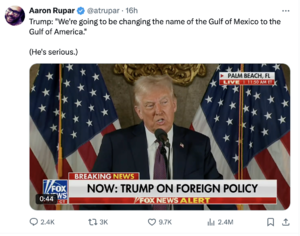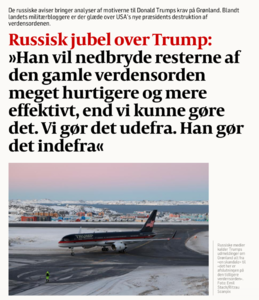Bak betalingsmur i The New Statesman. Robert Kaplan om begynnelsen på USAs kommende fall (decline):
The future may not feature American decline per se, in spite of all the reasons I have mustered, but rather the gradual decline of all the great powers – leading to a more unstable and tumultuous geopolitics in general. And because technology has shrunk geography, forming a more anxious and claustrophobic planet, the feeling of crisis and instability will in the future be more than we can imagine – or be able to deal with.
Robert D Kaplan is the author of “Waste Land: A World in Permanent Crisis” (C Hurst & Co). He holds the Robert Strausz-Hupé Chair in Geopolitics at the Foreign Policy Research Institute
The world stands on a precipice, and the trends are not good. It was the United States whose economic wherewithal rescued Western civilisation in the Second World War and the Cold War. But whereas in 1945 the US accounted for half of all global manufacturing, it now accounts for roughly 16 per cent. America’s gross national debt stands at $36trn, and that debt is $1trn annually. Neither Democrats nor Republicans seem to have even a modicum of the self-discipline required to arrest those movements. It is such financial burdens and complexities that have been a factor in how great powers and empires have declined in the past: witness Rome, early-modern Spain, Habsburg Austria and Britain. This all matters greatly since, throughout history, it has been the great powers – like them or not – that have maintained a semblance of world order. And as they weaken, anarchy inevitably creeps in. Such are the broad outlines against which the recent American election is merely one episode.
That election was perhaps the most contentious presidential election in America’s history, revealing a country fatally split along ideological, class and cultural lines: lines ultimately created by globalisation, which has drawn half of America into its cosmopolitan orbit while leaving the other half high and dry. The globalised half consists of a liberal, stylish, whiskey-sipping, European-vacation-oriented upper-middle class which would not be caught dead in the flyover states of the Trumpian continental interior. Then there is the other half that for various reasons, personal and cultural, cannot compete on the global stage, and is stuck in place in the old nation state. Of course, I am describing not only America but a host of Western countries disunited by globalisation – just as the developing world is divided from the West, and just as the great powers are divided from each other.
America is key, though: it has occupied such a big space in the global order for close to a century that we almost take it for granted. In the print-and-typewriter age, mass democracy produced American dynamism: moderation and the political centre held the balance of power in a communications setting of comparatively lengthy, reasoned argument. By contrast, the digital video era, by rewarding short bursts of inarticulate passion, has fed the extremes of both parties, leading to dysfunctional politics. Because the political centre, which used to unite and overlap the two major parties, has disappeared, thanks in large measure to technology, the stakes in national elections have become existential, as each party loathes the other. Indeed, it is difficult to imagine a character like
Donald Trump except in the digital video era. The rise and fall of great powers and empires has often been tied to new technologies and the stresses they put whole peoples and civilisations under. In the fullness of time, with its gargantuan network of interstate highways, America might be consigned to being a great empire of the oil-and-gas, print-and-typewriter age.
This might immediately become apparent in the second Trump administration, which may be more radical than his first term, when, as an unknown quantity, he had attracted quite a few sensible and conventional Republicans and Republican-types to work for him in key positions. In the foreign policy sphere that experiment continues but some of the evidence is troubling. Witness Tulsi Gabbard, who isn’t remotely qualified, as his director of national intelligence.
Trump seems not to evolve in office. He is relentlessly impulsive and can be self-destructive, as his lifelong legal troubles attest. Keep in mind that American foreign policy is a product of both presidential instinct and bureaucratic finesse. The president makes gut calls on major issues of war and peace that the bureaucracy cannot decide on its own. Otherwise, the army of secretaries, deputy secretaries, undersecretaries and so on in the state and defence departments make the calls and run the American empire.
Those bureaucrats in both Democratic and conventional Republican administrations, though abused as members of the so-called deep state, are actually – I know many of them – the most prudent, qualified, and emotionally balanced group one could hope for. And the second Trump administration won’t have enough of them. Because of Trump’s reputational toxicity among the elite, his administration will be staffed by mediocrities and occasional incompetents. Many posts in the foreign policy realm might not be filled at all, as he intends to gut much of the federal workforce. This is the silent mechanism by which American power will decline.
But even if all that is true, decline can be exceedingly gradual and relative to that of competing powers, which may also be in decline for other reasons. The Habsburg and Ottoman empires were in decline during much of the 19th century, but only succumbed to extinction because they were on the losing side in the First World War. Decline by itself is not enough to kill a great power. Sometimes it takes a war or other kind of sudden cataclysm. And empires after declining for decades can revive. It is rarely a neat fall. Both Russian and Chinese history are replete with weakening dynasties that are replaced by new ones, only to spur national revival. In this way their civilisations can seem eternal. Something analogous could also happen to the US – and Trump, ironically, might be a catalyst of that, by cleaning out a bureaucracy with the help of
Elon Musk in order to create, eventually, a leaner and meaner institutional system.
Indeed, decline can be overrated. British power has historically been tied to the strength of the Royal Navy, which actually plateaued in the 1890s. But that did not stop Britain from winning two world wars and helping to save Western civilisation a half century after that decline set in. Because we cannot know what exactly is in store for us, we must continually struggle for a better outcome.
The United States still has enormous geographical advantages. It is bordered by two oceans with just a thin band of middle-class Canadian civilisation to its north; so that only the southern border with Mexico is problematic. That southern border may obsess Americans, but it is a minor concern compared with the historic border problems of Russia and China, the other great powers. The US is also blessed with hydrocarbons and other natural resources, in addition to a navigable, internal river system larger than that of most of the rest of the world combined. The temperate zone of North America is the largest, most secure and most powerful of the island satellites surrounding Eurasia, whose wars and other problems the United States is still substantially protected from.
As I have argued, decline can not only be gradual but relative, too. Because the United States is a democracy its problems are out in the open. In an authoritarian state such as China, the problems may be worse, but are obscured.
China’s economic circumstances are dire. Tens of millions of newly built housing units are empty in a country whose population is falling, reports the
Wall Street Journal. Chinese households are heavily invested in this declining real estate. Foreclosures are exploding in number. Local governments are drowning in debt. Foreign and Chinese money is regularly fleeing the country in the tens of billions of dollars. Youth unemployment is rising.
Xi Jinping’s Leninist rule has put the power of complex financial decision-making into the hands of ideologues, rather than into the hands of experts. This is all a recipe for epic social unrest down the road. America is far better off under Trump than China is under Xi.
Then there is Russia. Every month that the war in Ukraine continues, Russia’s ability to influence and control the Caucasus, former Soviet Central Asia, Siberia, and the Russian far east, is weakened. Russia has always been a weakly institutionalised state compared to China, and as Russian power declines across 11 time zones, Russia may yet become a low-calorie version of the former Yugoslavia.
Of course, Moscow can seek to influence elections across eastern Europe and the Caucasus: relatively low-cost intelligence operations. But the Kremlin lacked the ability to protect the Armenians of Nagorno-Karabakh, Russia’s historic allies, from ethnic cleansing at the hands of the Azerbaijanis in 2023.
The debilitating war in Ukraine, where Russia momentarily has the upper hand, is the surface evidence of a Russian state in deep crisis. Significant elements of the Russian elite have been alienated by Vladimir Putin’s invasion of Ukraine, but they are much more terrified of Putin himself losing power, as he may be the only thing holding the state together. There is no politburo or other bureaucratic system behind Putin to the degree that there was supporting the Soviet leaders.
Even in its present circumstances, the US is stronger institutionally and economically than the two other great powers,
Russia and China. And because of its boisterous, albeit flawed, democracy, America is continually capable of renewal. As for Europe, it is in the “fight zone”, facing an aggressive and unstable Russia to the east, and continued migration from the higher birth-rate societies of Africa and the Middle East to the south and south-east.
While much of the world becomes greyer, Africa is in the middle of a demographic youthquake, even as the Middle East is continually on the brink of region-wide war: both of which drive migration and refugees to a Europe whose indigenous inhabitants manifest zero population growth. This will continue to change the racial complexion of Europe, fuelling populist resentment.
Syria is only the latest case of a state in the Middle East in which a dictatorship has been toppled to much celebration. And yet no sturdy institutions exist within Syria to stabilise a country that has weathered different levels of tyranny and disarray since the French left after the Second World War.
The more the Middle East is on the boil, the more refugees will flee to Europe. Europe’s centre right is weakening, with an insurgent populist hard right slowly becoming the new European establishment, perhaps even moving towards the political centre in the course of coalition-building. The parliamentary systems in Europe may actually be capable of maintaining the semblance of a centre through inter-party negotiation, while the American winner-takes-all presidential system dooms Washington to executive leadership by the populist right or the progressive left. The result over several election cycles is philosophical incoherence, even as American military power continues in relative terms to diminish in an age of cheaply manufactured drones and other innovations – to say nothing of China’s shop-till-you-drop building and acquisition of warships.
People talk glibly about Brics+ countries filling the global power vacuum. Like the Non-Aligned Movement during the Cold War, Brics+ – which comprises Brazil, Russia, India, China, South Africa, Iran, Egypt, Ethiopia and the United Arab Emirates – has relatively little reality beyond the conferences it holds, which means the organisation is practically meaningless without a world media that attends and covers those conferences.
During the Cold War the Non-Aligned Movement, which had its first summit in Belgrade in 1961, effectively leaned towards the Soviets. That was its overwhelming reality, despite lofty speeches by Josip Broz Tito of Yugoslavia and Gamal Abdel Nasser of Egypt.
Today, what does India, for example, strategically have in common with Brazil or South Africa? Very little. Because of such geographical diversity, the geopolitics of the Brics+ nations are very different from each other. South Africa and the United Arab Emirates are both members of the Brics+ movement: the former is fervently anti-Israel, while the latter is unofficially pro-Israel.
In terms of strategic logic, there is less here than meets the eye. The Brics+ grouping could create a trading system that bypasses the dollar zone and gives its countries clout. But as they don’t yet represent a coherent political programme (except to undermine the West) their success in this endeavour might only contribute to global disorder.
The future may not feature American decline per se, in spite of all the reasons I have mustered, but rather the gradual decline of all the great powers – leading to a more unstable and tumultuous geopolitics in general. And because technology has shrunk geography, forming a more anxious and claustrophobic planet, the feeling of crisis and instability will in the future be more than we can imagine – or be able to deal with.

en.wikipedia.org













